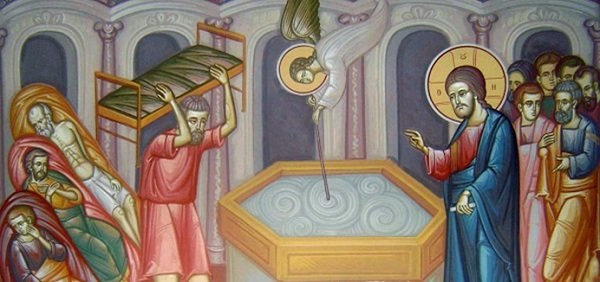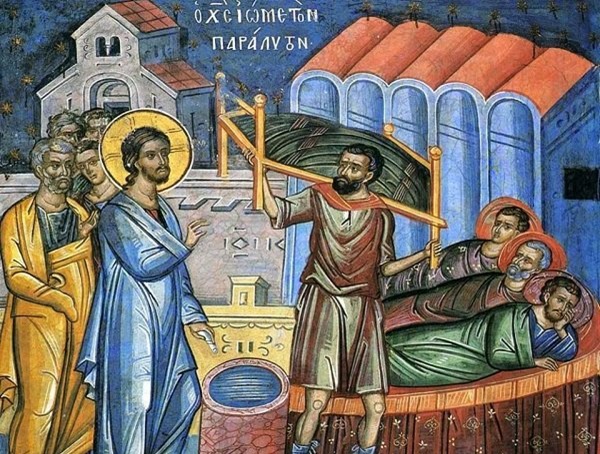The Word Renews Everything
23 May 2021‘Lord, the pool did not cure the paralytic; it was your word which renewed’
(Doxastiko, Lauds, Sunday of the Paralytic)
[Regarding todays’ Gospel reading, John 5, 1-15] Saint Mark the Patmian makes the apt point: ‘Who, then, would be so hard-hearted, so monstrous in their outlook, that they would not pity and sympathize today with the paralytic who spent so many years confined to bed, like an insensate piece of rock? Who would not sympathize if they thought not only about the pain which the severe illness of paralysis would have entailed, but the sorrow and distress he would have felt when he saw the angel troubling the waters of the pool; when he saw another person being healed and departing while he remained lying there forever’ (Homily on the Sunday of the Paralytic).

[When Christ asked the man if he wanted to be healed], he didn’t answer immediately ‘Yes, I do’, but instead complained to the Lord that he had nobody to help him: ‘Sir, I have no-one to put me into the pool when the water is troubled, and while I am going someone else steps down before me’ (Jn. 5, 7).
‘I have no-one’. This was the paralytic’s great complaint. There are no circumstances in our lives when we have no need of other people with whom we can exchange thoughts and reflection. It’s always difficult for us to deal with the difficulties of life on our own, particularly these days. It’s very important that we should have real friends in our life, though we should never forget that the first and truest friend is our creator, Jesus Christ. The Wisdom of Sirach says: ‘Faithful friends are a sturdy shelter: whoever finds one has found a treasure. Faithful friends are beyond price; no price can balance their worth. Faithful friends are life-saving medicine; and those who fear the Lord will find them’ (6, 14-16).
In one of the hymns for the feast, Christ is presented as replying to the paralytic in the following words: ‘I became human for you, I put on flesh for you and you say you have no-one?’ (Doxastiko of the Lity).
Saint Nikolaj (Velimirović), Bishop of Ochrid, wonders at the heroic patience of the paralytic. He says: ‘What heroic patience that man had! What superhuman efforts he must have made to drag himself to the pool just as the angel of God was troubling the waters. What firm hope he had in his cure, from one day to the next, from one year to the next, from one decade to the next’ [1].
In a homily on today’s Gospel reading, Saint John Chrysostom observes: ‘Let us then be ashamed and let us bemoan our great indifference. He was thirty-eight years in the same place and, despite the fact that he was unsuccessful in achieving his aim, he never gave up. And the reason he didn’t succeed wasn’t that he was indifferent, but that he was obstructed and ignored by other people. But he didn’t despair. If we had to wait even only ten days somewhere, asking for something we wanted and didn’t get it, we wouldn’t continue to show the same interest. Sometimes we stay with people for a long time, suffering the difficulties of the situation and performing acts of servitude, often without our hopes being met in the end. Yet we have no wish willingly to stay with our own Master from whom we shall certainly receive a reward greater than our efforts deserve – “hope does not disappoint”’.
The Lord immediately said ‘Arise, take up your bed and walk’. He went on to say: ‘See, you are well. Sin no more lest worse befall you’. Jesus’ words ‘and walk’ have a deeper meaning. They mean that, in essence, the point isn’t merely that we should be well in our health, but that we need our health in order to work for our salvation, for the glory of God. It means that we should walk in the way of the Lord. And the first thing we should do as members of our Holy Orthodox Church is partake in the sacraments of our Church and worship God. This is what we’re taught by the paralytic in today’s Gospel reading, when he found Jesus in the temple.
The Lord cured the body and now raises the event to a higher sphere, to its spiritual dimension. He makes the paralytic realize that the source and cause of this dreadful sickness is sin. Healing of body and soul is bestowed by our loving Lord on one condition: that we break away from sin, in particular deadly sin, according to Saint Ignatios of Stavroupolis.

Those who defeat their own sinfulness, their personal passions can easily resist the reprehensible habits, the common passions, the general foolishness of society. This is confirmed by the saints of our Church, who overcame their passions, were not affected by the folly of society, and confessed Christ crucified and risen from the dead. For love of him, they gave their blood as a seal of their confession.
The Lord performed this miracle in a way that is different from other wonders. He didn’t ask whether the paralytic had faith. This is because the man’s faith was more than obvious. This can be deduced from the patience he showed for thirty-eight years in the hope that he would receive help from heaven.
My beloved brothers and sisters, let us also have patience in the various difficulties we face and let us set our hope on Jesus Christ. The Lord came to become one of us, our friend, in order to relieve us of our great and burdensome problems by taking them upon himself. We must show confidence in him. As he cured the paralytic in the Gospel reading, so he’ll raise all those who trust him and submit their life to his divine will.






